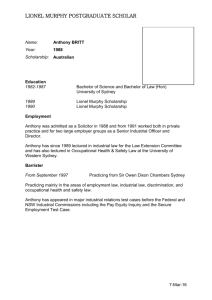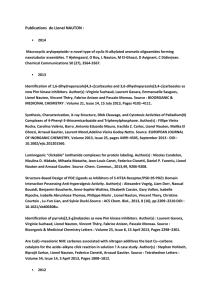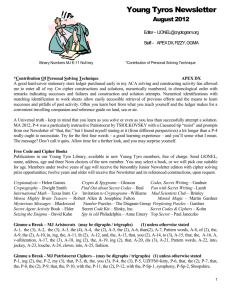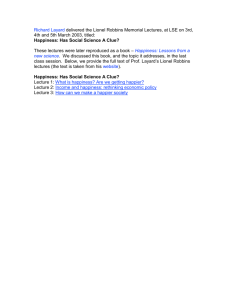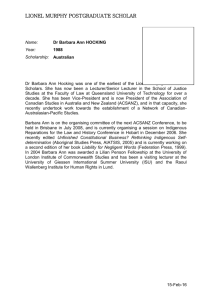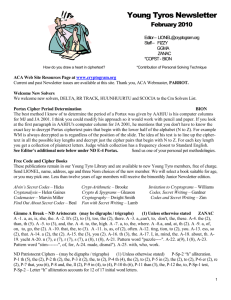04/16/92 A ~
advertisement
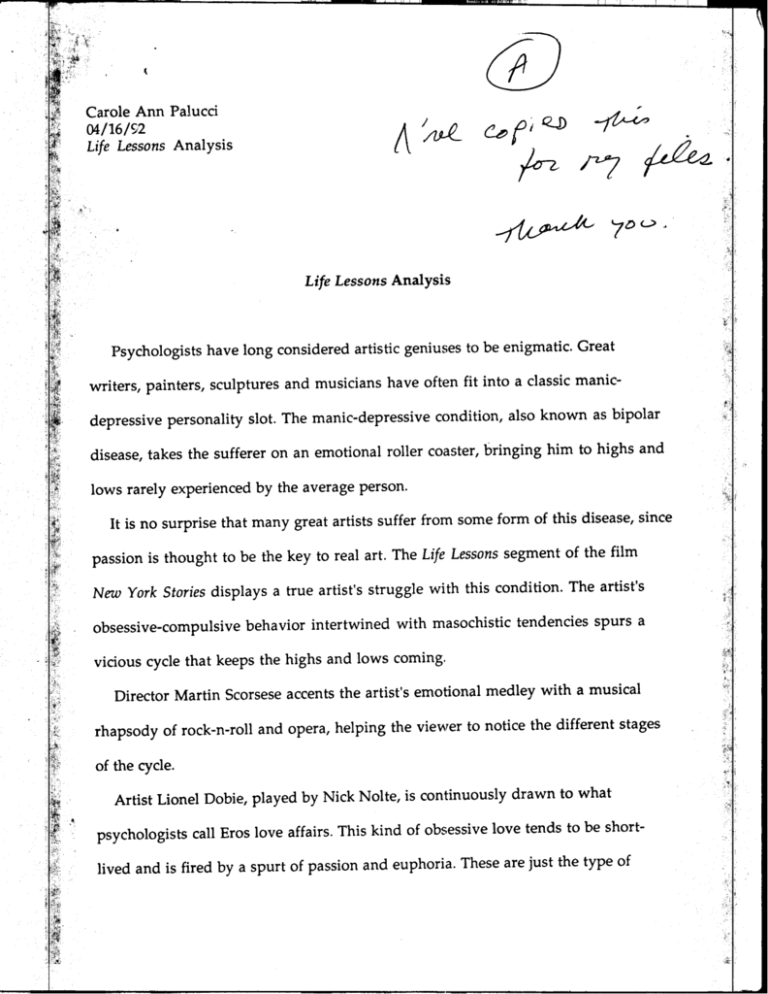
""" ( Carole Ann Palucci Life LessonsAnalysis 04/16/92 cD A~ (\ ~ f i Q.D h .-1"U.J12"'.,i ,tIC.",'7 l) (-:>. Lite LessonsAnalysi:s Psychologists have long considered artistic geniuses to be enigmatic. Great writers, painters, sculptures and musicians have often fit into a classic manicdepressive personality slot. The manic-depressive condition, also known as bipolar disease, takes the sufferer on an emotional roller coaster, bringing him to highs and lows rarely experienced by the average person. It is no surprise that many great artists suffer from some form of this disease, since passion IS thought to be the key to real art. The Life Lessonssegment of the film New York Stories displays a true artist's struggle with this condition. The artist's obsessive-compulsive behavior intertwined with masochistic tendencies spurs a vicious cycle that keeps the highs and lows coming. Director Martin Scorseseaccents the artist's emotional medley with a musical rhapsody of rock-n-roll and opera, helping the viewer to notice the different stages of the cycle. Artist Lionel Dobie, played by Nick Nolte, is continuously drawn to what psychologists call Eros love affairs. This kind of obsessive love tends to be shortlived and is fired by a spurt of passion and euphoria. These are just the type of ..2 . Palucci/page 2 strong feelings Lionel needs to inspire him; and he 11sesPaulette, the object of his desire, as a muse. But when Paulette leaves for a trip to Florida, Lionel is left with his unproductive self, and the three-week deadline for the show looms over him like a dark shadow. Plagued by frustration, he paces nervously in front of the stark canvas, clutching his cigarette, and squeezing a paint-stained rag. He swallows a mouthful from his brandy glass and stomps on a tube of paint, causing it to squirt out a blue glob --a color that also reflects his mood. Lionel is not only frustrated but frightened becausehe knows Paulette doesn't love him, as he states later on, and if she doesn't return his career will flop. His fear is heightened a moment later when his agent arrives at the studio to check on his progress. "There's nothing to see. It's the emperor's new clothes. I'm gonna get slaughtered, man ...I'm here and all I want to do is lay down. I'm taking a dive," Lionel answers when his agent asks to see his work. Lionel decides to go to the airport in hopes of persuading Paulette to corne back with him. He says he has to pick his assistant up at the airport when he turns down his agent's lunch offer. But Lionel must conceal the truth from his agent so he adds, "I don't know why she can't take a cab like everyone else." The grip of fear tightens when his agent asks when he can come back. Scorsese moves in for a close-up of the agent. "The show is in three weeks, you know," the 3 .( Palucci/page 3 agent warns. The close-up emphasizes the impact the statement has on Lionel, as does the following reaction shot of Lionel's wide-eyed expression as he hits the button to send the agent back to the depths he came from. Scorseseuses iris-ins and outs to help the viewer j:ocus on hints of lionel's obsession. The film opens with an iris-in to focus on Lionel's frustration and inability to perform without Paulette. Later, when Lionel waits for Paulette at the airport, Scorseseuses an iris-in on Paulette to show Lionel's obsession for her. When the iris-in is combined with slowmotion and Lionel's mesmerized gaze, the viewer becomes well aware of Lionel's obsession. Scorseseuses several iris-ins afterwards to emphasize just how much Lionel idolizes Paulette. One or two are used on Paulette's foot to imply that Lionel feels he's barely good enough to kiss her feet. Lionel is desperate to keep Paulette from leaving and, on more than one occasion, he uses manipulation to accomplish this. When Paulette reiterates that she is leaving him he pretends that he hasn't heard her message on his answering machine. It pains him to know she has been with another man, but he is smart enough to know that anger will only push her farther from him. He feigns an easygoing attitude but can't help prodding for the other man's identity. The name of her lover is important to Lionel because he needs it as part of his ~ Palucci/page 4 manipulation. Once he obtains her lover's identity he laughs and belittles the man in a patronizing manner, hoping to make himself IOtJklike a more prestigious choice. "Gregory Stark," Paulette reveals. "That kid? That comedian?" Lionel asks in laughing astonishment. "A performance artist," Paulette corrects. "Performance artist. What the hell is a performance artist? A person's an actor, a singer, a dancer. I mean, do you call the guy who takes out your garbage a sanitary engineer? A performance artist. And he left you. Now you see through that, right?" When Paulette insists she is still leaving him, he quickly switches to a different manipulative angle. He plays on her insecurity and financial despair, tones down her failed affair, then promises to relieve her of any sexual obligation. "Where you gonna go? What can you afford? YO11gonna move into a dormitory? You don't want to sleep with me no more, hey, I'm a big boy, you don't have to go out on the street. You had a fling. Big deal. Welcome to the real world. We're still employer-employee, right?" he says. Regret is reflected on her face as she agrees to stay with him. It is obviously not a pleasant arrangement in her eyes, but he is eager to settle for any little morsel she will give him. This is where his masochistic tendency is introduced, and the words , "Russian Roulette" printed on his truck door are a symbol of this characteristic. Throughout the rest of the story Paulette continuously thwarts him and ~ , Palucd/page 5 sometimes treats him cruelly. She taunts him, asks him if he loves her, then answers, "Well I don't love you." Another night she brings home a young artist and makes love to him while Lionel listens below. It seems she is punishing him for loving her in a selfish way --to feed his own passion and art. But this only makes him more fervent, and he becomes all the more engtllfed in his work. After each of these brutal occasions, Lionel delves deep into himself and paints feverishly to his blasting music. Paint blotches cover his beard, face, clothes and chest. Scorsesehas Lionel slip off camera and back on again while Lionel is in a painting frenzy. Scorseseshows that Lionel is now at the height of passion. Lionel dips in and out of his work becausehe is a part of it. Between Paulette's lashing out, she periodically asks Lionel to tell her what he thinks of her art. Her insecurity grows and she wonders if she has any talent at all. But Lionel manages to worm out of revealing his opinion to her, then chides himself for using phony speechesto escape. "For Christ's sake. If you give it up you weren't a real artist to begin with," he mutters to himself afterwards. "That was stupid, stupid." This implies that he thinks Paulette's art is no good, but refrains from telling her because that would eliminate her reason to stay. Eventually Paulette becomes fed up with Lionel's reluctance to treat her like a person instead of an object. She longs for the opinion he never gives her and prepares to leave. Lionel makes one last desperate attempt to manipulate her into staying, but it is too late. He has pushed -~::5' . - , Palucci/page 6 her over the edge. Lionel begs her to think of her painting. "Tell me what's here. Don't give me this shit about real artists have no choice. What's here? Am I good? Will I ever be good? Come on, right now. Come on!" Paulette says as she makes one last effort at getting his opinion. The fear of her leaving prevents Lionel from answering at first, then prompts his futile, "You're young yet. I love you." His reply brings her anger and the problem to a head. Paulette is well aware of the purpose she has served. "Love me? You just need me around. Sometimes I feel like a human sacrifice. I don't know, maybe if I was as good as you I wouldn't care about anyone else either. But I'm not, so good-bye," she yells. The honesty of her response scareshim, makes him feel like a cornered rat. His defense mechanism kicks in and he tries to play on her insecurity again. He tells her she can't appreciate his love for her because she doesn't love herself, but she is on to him and doesn't fall for it this time. Lionel is forced to admit the truth, that he indulges in love, indulges in making his "stuff," and that "they come together at times." Lionel is not a vicious user, but a victim of his own compulsion and obsessions. Over and ove~ls into the same scenario, only the details are different. The viewer and Paulette discover his pitiful, repetitive suffering when he makes his last exclamation to her. "Let me tell you something. You think I just use people, just write them up. Well , , Palucci/page 7 you don't know anything about me. You don't know how involved I get or how far down I go. Hell, I was married four times since beforl~ you were even born, so don't tell me!" he says. Lionel paints on with a vengeance, muttering how "chippies" chip away at him and his talent. Then he stops, grabs his face with a paint-laden hand. He can only gasp at the phenomenal work he has created. This shows that his emotions, relationship, and work have reached their climax simultaneously, and proves they are an intertwined part of his condition. The condition slips into a lull and is quickly reawakened when Lionel discovers his next muse at the show. Scorseseuses the close-ups once again to display Lionel's obsession with the new beauty, then uses an iris-out on Lionel and the muse, now alone after the show's end. And the cycle continues.


